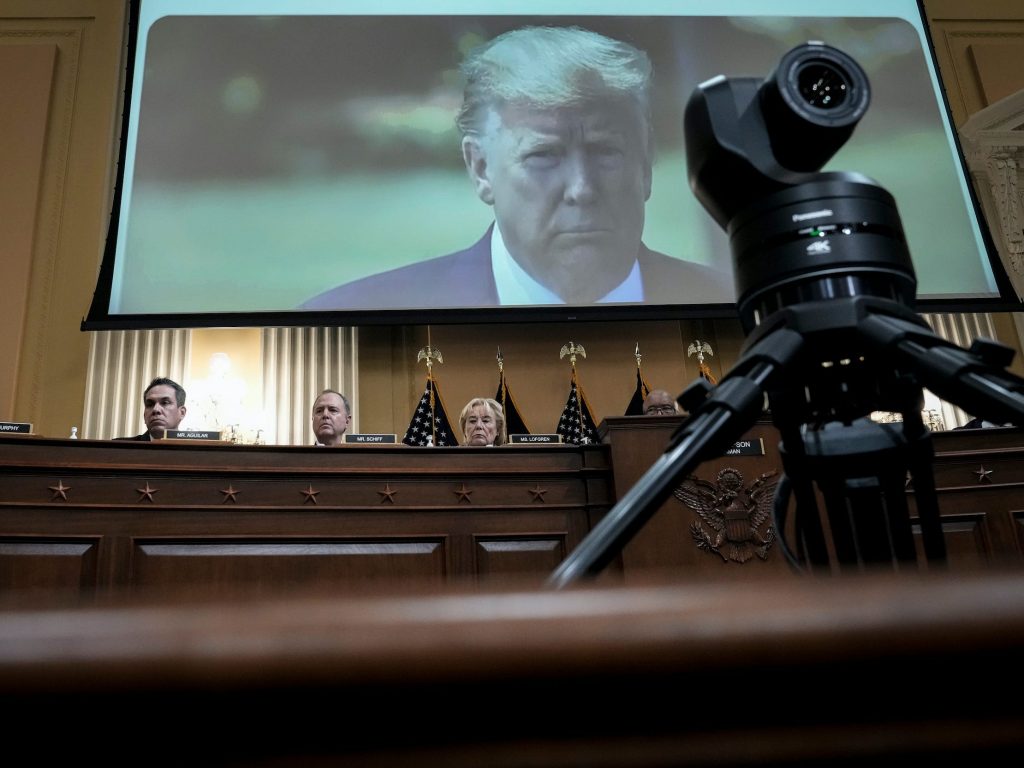- Lots of Republicans are waiting to see whether Trump will run for the White House.
- The general consensus is that they don't stand a chance of beating him in a primary.
- This is their take even with the Jan. 6 hearings in the mix.
The many Republicans jonesing for the 2024 presidential nomination shouldn't count on this month's January 6 hearings to give them the edge against former President Donald Trump.
GOP strategists and people close to the president predict the hearings will make little difference on whether any other Republicans choose to challenge Trump in 2024 if he runs again.
"I don't think it changes their calculus," said said Mike DuHaime, the CEO of MAD Global who managed former Gov. Chris Christie's 2016 presidential campaign. "Those who are afraid to run against Trump still will be, and those who aren't were all ready to go."
"Those who have already signaled that they won't run against Trump know that he will still maintain a core of support by playing the victim through this process," he added.
The acceptance of Trump's hold on the nomination is notable after the January 6 committee released graphic, violent footage of the attack and emotional testimony from a badly wounded police officer to an audience of over 19 million viewers.
Thursday evening marked the first of six public hearings that the panel plans to hold in June to reveal its findings after a year-long investigation and more than 1,000 interviews. Their goal is to make the case that Trump — then, now, and in the future — poses a grave threat to Democracy.
But the committee is trying to reach voters whose belief that Trump had a clear role in the riot has been fading over time. Right after January 6, one quarter of voters polled by the Pew Research Center said they thought Trump had no responsibility for the attack. One year later, that total rose to one-third.
People have already decided where they stand on the issue and the hearings will have a "minimal effect," said Saul Anuzis, a GOP political consultant with Coast to Coast Strategies and former chairman of the Michigan Republican Party.
"Either this is a devastating conviction of Trump and his agenda, or nothing more than a sham hearing trying to blame Trump and hurt Republicans," Anuzis said of where voters stood on the topic of January 6.
Rehashing the events certainly doesn't help Trump, according to Sam Nunberg, who advised Trump's 2016 presidential campaign.
He said the hearings were a "deep cut" and part of what has been a slow bleed for the former president since he left office, including lower fundraising totals and several losses among candidates he endorsed.
"He has got his failings and this certainly brought it out in the clear," Nunberg said.
But Nunberg doesn't think the issue will stick with conservative voters. If Republicans plan to run against Trump, they shouldn't make the Capitol riot their lead attack because it won't be the top issue for voters, he said.
"That's a losing tactic," he said. "It's worse than pointless. It's actually going to hurt your own candidacy."
Instead, he said they should blame Trump for "handing the presidency over to Fauci" during the COVID-19 pandemic — meaning Dr. Tony Fauci, the nation's top infectious disease expert — and for losing majorities.
The hearings aren't expected to dent the midterms for Republicans
Republicans in Congress are banking that the riot will be a low priority for voters and expect to shellack Democrats in the miderms because of Biden's poor polling. They predict voters will care more about record-high inflation and high gas prices.
"From a Republican perspective you want to keep the focus on Biden, Pelosi, Schumer, and what we call the radical left progressive agenda and the things they are doing regarding inflation and cultural issues," Anuzis said.
House Republican leaders have stood by Trump, and like him have called the January 6 investigation a "sham" that will result in a dishonest inquiry. They refused to appoint Republicans members to participate in the committee after House Speaker Nancy Pelosi rejected Reps. Jim Banks of Indiana and Jim Jordan of Ohio, who voted against certifying the 2020 election results in Arizona and Pennsylvania, two states that President Joe Biden won.
The hearings could help Democrats in states where they're running against insurrectionists in the general election, said Gunner Ramer, political director for the Republican Accountability Project, an anti-Trump organization that supports pro-Democracy Republicans. He cited as an example election denier Doug Mastriano, who won the GOP nomination for governor in Pennsylvania.
But for the 2024 Republican nomination for president, Ramer predicted it would have little effect.
"I still think he is the likely Republican nominee and this doesn't change anything," he said.
Jason Miller, the CEO of social media company GETTR who was Trump's spokesman during the 2020 election, predicted on Friday that the hearings would have "zero impact on either front," whether it be how voters feel about Trump or in who chooses to run in 2024.
On Thursday evening, the committee aired one of Miller's responses to their questions and he defended himself on social media, providing the full transcript of his remarks.
—Jason Miller (@JasonMillerinDC) June 10, 2022
"Everything being done by this committee is for political gain," Miller told Insider. "Selectively editing my testimony proves that."
Michael Caputo, who worked on Trump's 2016 presidential campaign and at the Department of Health and Human Services, said he was delayed at the airport when the hearings were taking place and found a corner where he wouldn't have to look at CNN.
"I don't know one Republican primary voter who watched the sham January 6 hearing," he said, calling it a "series of performances" that was "clearly partisan" and "filled with lies."
"The only people who believe this crap are already voting against Trump — and any Republican who watched Thursday night should have their red card pulled immediately," he said.
A large number of Republicans might run in 2024
Plenty of Republicans have been buzzed about for a potential 2024 run. They include come-again candidates such as GOP Sens. Ted Cruz of Texas and Marco Rubio of Florida, and would-be first-time presidential candidates like former Vice President Mike Pence, Florida Gov. Ron DeSantis, UN Secretary Nikki Haley, and Secretary of State Mike Pompeo.
Both Christie and Maryland Gov. Larry Hogan, an anti-Trump Republican, have said they'd run for president regardless of what Trump does.
A recent NBC News report said that Trump might choose to announce as early as July 4 that he's running. But the former president could easily wait until the middle or even end of 2023 to reveal his intentions and still have plenty of time to qualify for primary ballots and run a nationwide campaign.
But winning the nomination doesn't mean Trump would win the presidency, DuHaime said.
"Biden and Democrats are really hoping Republicans nominate Trump," he said. "Almost any Republican other than Trump could keep 2024 focused on Biden's performance. All other Republicans could focus on the future while Trump can't help but focus on the past."

